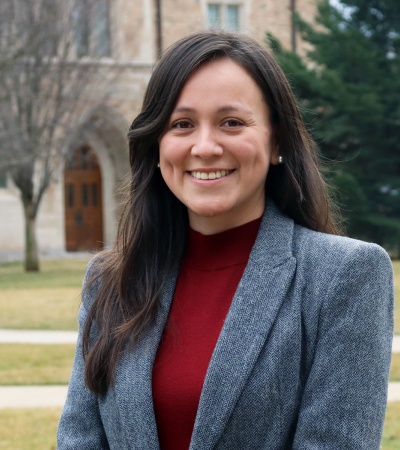Red para el Estudio de la Economía Política en América Latina (REPAL) Annual Meeting; Washington,D.C.
Kellogg Institute Conference Travel Grants
Conference: Red para el Estudio de la Economía Política en América Latina (REPAL) Annual Meeting; Georgetown University, Washington, DC
July 12 and 13, 2024
Presentation: Land Dispossession on Trial: Social Movements and Judges in the Colombian Land Restitution Program
Report:
 Doctoral Student Affiliate Isabel Güiza-Gómez participated in the Red para el Estudio de la Economía Política en América Latina (REPAL) Annual Meeting, held at Georgetown University in Washington, DC, on July 12 and 13, 2024. Through a Kellogg conference travel grant, Isabel presented a paper entitled “Land Dispossession on Trial: Social Movements and Judges in the Colombian Land Restitution Program,” which was awarded the REPAL 2024 Best Paper Award. The project examines the conditions under which victims' movements successfully influence local lower courts to transfer property rights from economic elites back to peasants dispossessed during the Colombian civil war. Conflicts over property rights are especially acute in war-affected areas, where dispossession has been a pervasive form of violence against civilians. Dispossession can take place through illegal actions led by combatants seeking territorial control or legal exploitation by elites benefiting from the uncertainty that war brings. In such contexts, reparation programs are designed to redress these injustices by restoring property rights and returning homes and land to victims, as seen in programs in Bosnia and Herzegovina, South Africa, and Colombia.
Doctoral Student Affiliate Isabel Güiza-Gómez participated in the Red para el Estudio de la Economía Política en América Latina (REPAL) Annual Meeting, held at Georgetown University in Washington, DC, on July 12 and 13, 2024. Through a Kellogg conference travel grant, Isabel presented a paper entitled “Land Dispossession on Trial: Social Movements and Judges in the Colombian Land Restitution Program,” which was awarded the REPAL 2024 Best Paper Award. The project examines the conditions under which victims' movements successfully influence local lower courts to transfer property rights from economic elites back to peasants dispossessed during the Colombian civil war. Conflicts over property rights are especially acute in war-affected areas, where dispossession has been a pervasive form of violence against civilians. Dispossession can take place through illegal actions led by combatants seeking territorial control or legal exploitation by elites benefiting from the uncertainty that war brings. In such contexts, reparation programs are designed to redress these injustices by restoring property rights and returning homes and land to victims, as seen in programs in Bosnia and Herzegovina, South Africa, and Colombia.
However, addressing property dispossession is a complex and divisive process. Reparation programs require well-equipped institutions with necessary capacity to recover land from powerful elites and redistribute it to marginalized groups. This often entails creating new administrative bodies and courts to handle land conflicts, process claims, and manage the reallocation of property rights. Given their authority and formal independence, judges play a central role in adjudicating these claims, resolving disputes over property rights and facilitating the return of land. Institutional innovation notwithstanding, judges are embedded in acute conflict wherein advocates for restitution class with opponents of wealth redistribution.
Together with Laura García-Montoya (University of Toronto), I argue that victims are more likely to regain their lost property through legal channels when two critical conditions are met: (1) claimants possess strong social mobilization capacity, and (2) judges have access to comprehensive information about rights violations. Social mobilization capacity enables claimants to expand their networks and engage in disruptive actions that influence judicial rulings in favor of restoring their property rights. These networks can strengthen the legal standing of claimants by signaling to courts that a broad coalition supports restitution efforts. Additionally, public protests can raise the political stakes for judges, making it costly for them to ignore such claims. Furthermore, well-informed courts, aware of the extent of dispossession and rights violations, are more likely to dismiss the claims of powerful economic actors and uphold the property rights of aggrieved parties.
We test the empirical implications of our argument by examining judicial behavior in Colombia’s land restitution program from 2013 to 2023 at the subnational level, focusing on particularly “hard” cases—those involving competing claims from third parties. Using regression analysis, we explore whether social mobilization capacity and issue salience influence judicial decisions concerning property rights. We draw on a unique dataset assembled through web-scraping of 1,355 local judicial rulings and 2,452 editorials and opinion pieces from 71 subnational and 9 national media outlets between 2012 and 2023. We also collected novel data on social movements advocating for land restitution and coverage of restitution issues across municipalities in local newspapers.
The Kellogg conference travel grant allowed me to reconnect with a dynamic and engaged community of scholars specializing in the political economy of Latin America and the Caribbean. The thoughtful and constructive feedback I received from conference participants has been instrumental in refining both the theoretical framework and empirical design of this paper. Moving forward, we will enhance our analysis by integrating quantitative findings with qualitative insights, conducting in-depth interviews with social movement representatives and judicial personnel, and undertaking a comprehensive review of judicial rulings. This multi-method approach will further strengthen the robustness of our conclusions and broaden the scope of our research.






